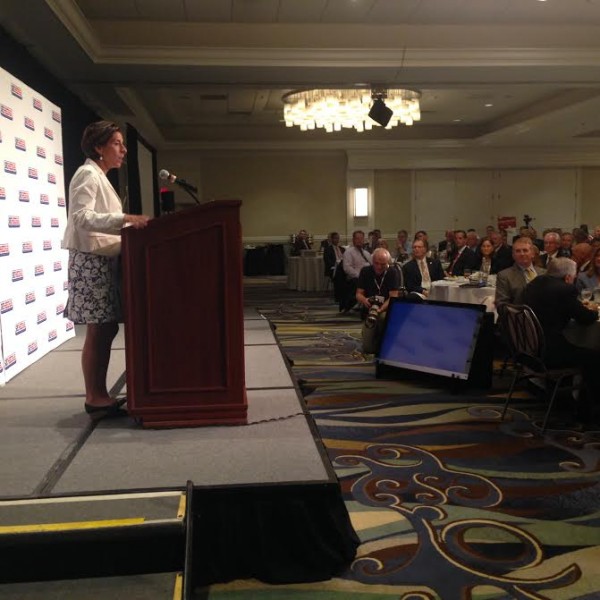 Governor Gina Raimondo spent Tuesday traveling around southern Rhode Island celebrating economic victories. But as her visits to Newport and Westerly indicate, not everything that benefits the Ocean State economy is necessary good for the rest of the world.
Governor Gina Raimondo spent Tuesday traveling around southern Rhode Island celebrating economic victories. But as her visits to Newport and Westerly indicate, not everything that benefits the Ocean State economy is necessary good for the rest of the world.
In Newport, Raimondo spoke at the annual conference of the Southern New England Defense Industry Alliance, a sort of chamber of commerce for the military industrial complex in southern New England. “We need to focus on what we are good at and we are good at defense,” Raimondo told the group at the Newport Hyatt Regency Hotel on Goat Island.
The defense sector is an important economic engine for Rhode Island, to be sure. According to a 2014 report from SENEDIA, there are more than 32,000 defense-related jobs in Rhode Island – about 6 percent of all jobs in the state. But there are obvious downsides to profiting from warfare. Providence-based Textron is the last North American company to still make cluster bombs and these controversial weapons of war are sold to Saudi Arabia and have been used on civilians in Yemen, for example.
“Of course we wish we lived in a world where this isn’t necessary,” Raimondo told me after her speech. “I wish there was no need for any of this. It’s an issue that I think we all grapple with. But the reality is we live in a very unsafe world, so it’s our job to protect our people.”
Later in the day, Raimondo went to Westerly to welcome Ivory Ella, a clothing company, to Rhode Island. The online retailer that employs about 40 people was convinced to relocate from Groton, Connecticut to Westerly with the help of $362,000 in tax credits from Raimondo’s Commerce Corporation.
“My good day today is not a good day for the governor of Connecticut,” Raimondo said to me.
“But,” she added a little later on in our conversation, “I hear your point.”
The point is that when one state pays a company to relocate there, it is also paying that business to damage another state’s economy. There’s been much written and said about states poaching jobs from one another – the Washington Post, the New York Times and the Providence Journal have each documented the downside of the practice.
Raimondo said it isn’t her job as governor of Rhode Island to worry about other state’s economic hardships.
“I’m elected by the people of Rhode Island to take care of Rhode Islanders,” she told me. “I’ve got a mission and my mission is to expand opportunity here.”
In some ways it’s great that Rhode Island has a thriving military industrial complex. And in some ways it’s great that we can poach jobs from Connecticut. But in the grand scheme of things these both seem like bad long term investments for our society, if not our economy. Unless, of course, you assume the United States and Rhode Island will always be at war with other parts of the world, including Connecticut.
]]>
Jeff Grybowski didn’t set out to save the world from climate change. The CEO of Deepwater Wind, which just completed construction of the nation’s first offshore wind farm, wasn’t trying to be the first in the United States to commercially harness the offshore breeze and, in the process, potentially create a new sustainable industry for his home state.
“I freely admit that I didn’t know anything about energy before I started this,” he said, during an interview at Deepwater Wind’s downtown Providence office. “I didn’t think anything of it. I had no opinion.”
The Cumberland native and Brown grad was a corporate attorney in Providence, fresh off serving as chief of staff during conservative Republican Don Carcieri’s first term as governor, when a group from New Jersey approached him about the idea.
“It was the middle of 2008, that summer, when they called me and asked me how do we get a permit to build an offshore wind farm in Rhode Island,” he recalled. “I was doing regulatory law and we all started scratching our heads. But we were lawyers and we wanted to help answer the question.”
The process
Grybowski knew a thing or two about the regulatory process, both from his legal practice and his tenure in the executive branch at the State House, and that proved to be the name of the game.
“For offshore wind in the U.S. it’s never been about construction,” he told me. “It’s always been about the regulations and the legal structure that allows it to happen. Obviously we build things that are as big and as complex as an offshore wind farm. The offshore oil and gas, that stuff is much bigger. The question is can we as a society agree how to build these things, where to build them and what steps you need to take in order to get, let’s call it, community sign off. It was the newness of it, that was the biggest obstacle.”
The Block Island wind farm had to win approval from more than 20 federal, state and local government agencies before construction could start, he said.
“It was great that the U.S. Department of Energy says we think offshore wind is a huge resource and we should develop it,” he said, “but the reality is that really wasn’t as important to us as whether the town of New Shoreham thought it was a good idea.”
Navigating the regulatory process, Grybowski said, is Deepwater Wind’s “core competency.”
He explained, “You need to take it to not only all the agencies of the federal government and people who need to say yes, or who have a veto, and then you bring it down to the state government, all the different agencies, and then down to the local government. And all across that chain you have stakeholders who have the ability to influence the agencies. It’s a huge matrix. You’ve got to find a way to get yourself through that matrix of agencies and stakeholders, and that’s what I did.”
An energy transformation
Along the way, Grybowski also went from being the company’s legal counsel to being the company’s CEO. Eight years after the project was first conceived, Deepwater Wind just finished construction of the first offshore wind farm in the United States. The 5-unit array will produce 30 megawatts of power. Enough, Grybowski said, to power 17,000 average U.S. households.
It’s a relatively small amount of electricity, but Grybowski thinks it’s a big step in what he called an “energy transformation” away from fossil fuels toward renewable energy sources.
“I think offshore wind is about to become a huge component of this energy transformation,” he said. “As a native Rhode Islander I might have been quicker than others to recognize how ideally suited this state was because of our proximity to this enormous resource and because of some of the logistical advantages we have.”
It’s an obvious opportunity for the Ocean State, he thinks.
“We don’t generate a lot of resources locally,” Grybowski explained. “Coal gets shipped in. Gas gets piped in. We’re the end of the line from an energy perspective. But that’s one of the brilliant things about offshore wind for this region. We’re the beginning of the pipeline here because we control the resource. It’s right off our coast. It’s the single biggest natural resource that we have to produce energy in this region.”
The future for offshore wind
Deepwater Wind is already planning its second project. The company has leased 200 miles of ocean about 15 miles southeast of Block Island that could support 200 turbines, compared to the first farm’s five – or 1,000 megawatts compared to just 30. He thinks there is five times that much potential wind farm energy in the vicinity.
“There’s the capacity for 5,000 megawatts of offshore wind out there,” he said. “That’s just in the area that’s been identified in the near term, what could be developed in the next decade or so. That’s certainly not the limit of what we can do.”
Collectively, all the power plant in New England currently generates some 30,000 megawatts of power, Grybowski said. The northeast can expect offshore wind to meet a more substantial portion of its energy needs when it goes even farther offshore.
“That cable really isn’t that expensive,” he said. “It’s copper and plastic, so a little bit more really doesn’t matter that much. The other difference is it becomes deeper the further out you get so the steel structures that you have to use to put these on the ocean floor get taller and heavier. The equipment that you need to install it becomes bigger. Part of the science of the business is where is that sweet spot. Where is the sweet spot of the benefit of the wind versus the downside of the extra costs of getting to that wind.”
Grybowski added, “It’s a lot like the offshore oil business, forget about the resource. It’s the same kind of analysis we go through.”
Much of the offshore wind industry, he noted, is based on the offshore oil and gas industry. Deepwater Wind President Kris Van Beek relocated from the Netherlands to Providence. “He transitioned from offshore oil and gas to offshore wind and he moved to Rhode Island to do that,” Grybowski said. “He knows how to build things in the middle of the ocean.”
Rhode Island, energy exporter
It’s part of the energy transformation he spoke about.
“Unfortunately, the change from a micro-perspective seems really slow but I think the change is pretty inevitable,” Grybowski said. “It’s inevitable that, here in the Northeast, we are going to be building a lot of offshore wind in the coming decade. It’s impossible for us to meet our energy needs, and doubly impossible to address our energy needs and address climate change in a meaningful way, without building a significant amount of offshore wind.”
He was quite confident offshore wind would help us get the Ocean State to sustainability, boasting, “I think Rhode Island – for the first time in, maybe, forever – is going to be an energy exporter.”
]]> When the cache of documents related to the ongoing 38 Studios lawsuit (click here to view or download) brought by Governor Linc Chafee was released on September 24, a wealth of information was opened up. After years of curiosity, the public was able to see almost totally the chain of events that led to one of the biggest financial boondoggles in Rhode Island history.
When the cache of documents related to the ongoing 38 Studios lawsuit (click here to view or download) brought by Governor Linc Chafee was released on September 24, a wealth of information was opened up. After years of curiosity, the public was able to see almost totally the chain of events that led to one of the biggest financial boondoggles in Rhode Island history.
After years of spin, lack of comment, and problematic answers, we bring you an analysis of the sworn and true answers of the three public officials to occupy the governor’s office since the deal was struck.
DONALD CARCIERI
 After multiple days and 562 pages of deposition testimony, it is clear that former Governor Don Carcieri, the man responsible for the 38 Studios deal as chairman of the EDC, is nervous. Throughout the transcript, he peppers his answers with “you know” – a sign of anxiety.
After multiple days and 562 pages of deposition testimony, it is clear that former Governor Don Carcieri, the man responsible for the 38 Studios deal as chairman of the EDC, is nervous. Throughout the transcript, he peppers his answers with “you know” – a sign of anxiety.
When Carcieri took office in 2003, he touted himself as a pro-business reform candidate, campaigning on a promise to bring a ‘Big Audit’ to the convoluted state government. One of these moves included merging the Economic Policy Council and a smaller EDC into the single agency that approved the 38 Studios funding package. He says of the decision:
[I]t was a board decision. This was not my decision alone. I mean, this was a quasi-independent corporation. We went through lots of pains to restructure the whole corporation, created a whole new board, and as I said, I felt very pleased at the quality of the people we were able to attract, and I wanted to make sure that they could do their job.
Carcieri thought they had a prize in 38 Studios, a company that would spur the growth seen in the Cambridge, Massachusetts high-tech corridor on Route 128 decades earlier. At one point, Robert Stolzman, now a defendant in the lawsuit, wrote to the governor thanking him for involving him in the 38 Studios issue. With predicted earnings of $50 million by 2015, they believed they were going to be responsible for a high-tech renaissance.
They expected that they had a real winner in terms of a game and what they were doing in developing with a lot of industry expertise in this multi-player game was going to be very well received. They, you know, were supported in that, to my knowledge, by entertainment arts [Electronic Arts video game publishing] who understood the industry as well.
But there were warning signs from the outset that Carcieri refused to heed. One board member at the EDC, Karl Wadensten, voiced concern about the total monies being dedicated towards the project. Rosemary Gallogly, a seasoned adviser with years of experience regarding government accounting, raised multiple red flags that the governor blew off as infrastructural issues, part of the ‘big government’ he had vowed to fight.
-I don’t recall reading the whole [Strategy Analytics] report [regarding risks and possibilities]. Often they have executive summaries is what I would read, then I would skim, possibly, through, but what I’m saying to you is this is not my recollection of what was presented to the board meeting. That there was a slide dec. like all — PowerPoint or something that, you know — the sum and substance was, on balance, positive that’s my recollection, Tom.
-You’re saying your recollection on balance was positive?
-Yeah.
-Of the Strategy Analytics report was positive?
-Yes.
-Now, but you don’t know if you actually read the entire report or not, do you?
Two things become abundantly clear from Carcieri’s testimony.
First, despite boasting about his business savvy, he remained woefully out of touch with the industry he was trying to get involved in and remained so last year when deposed. Throughout the transcript, he consistently confuses the name of EA Games, the third-largest video game firm on earth, calling them ‘Entertainment Arts’ instead of Electronic Arts. When discussing the second title 38 Studios was working on at the time of their bankruptcy, a massive multi-player online game akin to the popular WORLDS OF WARCRAFT, he is hazy on the terms used in distribution, calling the industry-standard subscription-based servicing of those titles a “lease.”
That is a sign of bad business management. The Oracle of Omaha, Warren Buffett, has been very open with how he made his fortune, explaining that, if he cannot understand a prospective investment and how the company works when he sits down at his kitchen table with the spreadsheets, he passes on the investment. Buffett does not have access to the secret formula for Coca-Cola or understand how Dairy Queen produces all their dessert items, but he does understand how to drink soda and take his grandchildren out for ice cream. The trick with smart investment is understanding exactly why a product or service will have success, not due to innovation as much as appeal. In the case of 38 Studios, Curt Schilling could and probably should have done what most sports players do in retirement when they get involved with video games, release a title based on his name recognition and sports career. It may not have been as exciting as the roll-playing fantasies he hoped to develop with sci-fi author RA Salvatore, but no one has seen John Madden crying on the way to the bank. Carcieri and Schilling were both clueless about everything from basic game programming to distribution models. The former Governor was so out of touch he did not even realize that the board he was chair of had not hired IBM and Wells Fargo as consultants! That he did not know he was not the first to talk with Schilling about the venture is merely the pinnacle of his lack of connection, regardless of whether politicians like William Murphy, Gordon Fox, and others lied to him.
Carcieri also seems to have let his ideology get in the way of basic economic logic regarding recovery from a recession. Even though they portrayed themselves as conservatives, Schilling and Carcieri bear all the markings of classical English liberals in the economic sense, fiercely opposed to unions and praising the virtues of so-called ‘free markets’ and supply-side economics. They wanted to create a business boom in the tech sector, which is non-union.
Besides the aforementioned lack of industry literacy, Carcieri and other Rhode Island officials fatally misjudged why the Massachusetts Miracle happened in the first place. In that instance, technology firms since the 1960s had been creating a diverse set of products that reaped millions. And while they did see a particular boom in the 1980s and 1990s with computer software, the vast majority of the products created were technologies used in unionized jobs, such as municipal construction or lighting devices, industries with almost-guaranteed supply-and-demand ratios as opposed to video games, which are wildly uncertain in success based on the nature of customer satisfaction.
The reality is still as John Maynard Keynes told us 80 years ago, the way to get out of a recession is by having a government spend huge amounts on public works and infrastructure projects that create long-lasting, good-paying, unionized jobs. As the workers continue to take home good paychecks over the course of years, they in turn spend their earnings on everything from houses to cars to luxury services that they could not afford previously. That was the reason President Eisenhower, as a Republican, was pro-union and opposed the anti-labor ideologies of Joseph McCarthy and Barry Goldwater. He knew then that the middle class prosperity he oversaw was dependent on organized labor serving as a balance with the controlling powers of big capital. The fact Carcieri mistakenly thought that RISD could perform the same services as MIT and Harvard and that their wildly unpopular former President John Maeda would help foster this boom is the tragically ironic icing on the cake.
LINCOLN CHAFEE
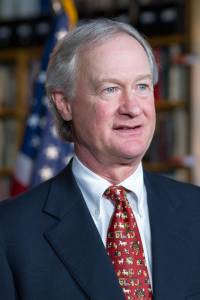 When Lincoln Chafee took the governor’s office in January 2011, the state was in a complete crisis. Municipalities were on the verge of bankruptcy. The pension system was in trouble. And when, during his campaign, he had opposed the passage of the 38 Studios deal, he was blocked from speaking at an EDC meeting and “swatted aside” by a state trooper. He left office as a very unpopular man, with then-Treasurer Gina Raimondo having bad-mouthed him both in the press and during election debates.
When Lincoln Chafee took the governor’s office in January 2011, the state was in a complete crisis. Municipalities were on the verge of bankruptcy. The pension system was in trouble. And when, during his campaign, he had opposed the passage of the 38 Studios deal, he was blocked from speaking at an EDC meeting and “swatted aside” by a state trooper. He left office as a very unpopular man, with then-Treasurer Gina Raimondo having bad-mouthed him both in the press and during election debates.
I was apprehensive, given my very, very vocal opposition to the deal in the campaign, including going uninvited to an EDC board meeting and being barred from entering, that I could be accused of meddling, micromanaging, interfering. There were still board members that were very- had voted in favor of this deal. The executive director and I had sparred in the course of the campaign, now he was my executive director of the EDC. I was very apprehensive about, as I said, micromanaging or meddling in this. I saw my role as to be supportive and write the checks and hope that that first game was successful… We inherited an inferno.
Now comes the release of his deposition. Of all the motley crew of big-shots and political players, he comes across as not just respectable but actually the closest thing to a hero. I do not agree with all of his policy moves while in office, including the public sector pension reform he oversaw, but it is obvious he did not care about his image, he cared about Rhode Island.
-I did get a call from Providence Equity leadership who experience in this area and shared my initial thoughts and opposition and reinforcing that.
-When you say Providence Equity leadership, is there a particular individual you spoke with?
-My classmate, Jonathan Nelson… I had expressed opposition at that point to the loan, and he said I’m in the business, this business, and you’re right about your opposition.
From day one, Chafee was educating himself about the video game industry and saw a turkey. One of the many exhibits in his deposition is a packet of news articles and analyses that he had in his campaign office, representing the level of research he was doing during a busy election season about an industry he and everyone else knew nothing about.
-Yes, these documents we came upon after the request to make sure we had given everything that we had, and just in further searching, these are the documents that reflected that further search.
-Where were they found?
-Some in my campaign office, which was not my original campaign office that I had during the campaign, but a subsequent mini closet, almost, where we store a number of items, and others were in the governor’s office.
-Okay. The mini campaign office you refer to, where is that located?
-Airport Plaza, Warwick, Rhode Island…
-Did you ask any members of your campaign staff to do any research for you into any issues which may concern this type of potential relationship with a company like 38 Studios?
-I’m sure being a team effort and this being a major item in the news and being, you know, a very, very competitive campaign everybody was involved in finding out as much as they could about all the details of this type of state investment.
In both the deposition and public statements, Curt Schilling and his lawyers have tried to blame Chafee for their failures. They claim the governor’s press statements were the kind of bad publicity that drove away potential investors and ultimately caused the company’s failure. In the deposition, Schilling’s lawyer Michael Sarli repeatedly tries to pigeonhole Chafee and make him seem incompetent, a poor chair of the EDC board that was asleep at the wheel. The question, rephrased and repeated time and again, is contemptuous of the Governor’s office, to the point Max Wistow, the lawyer Chafee hired to represent the EDC and launch the current lawsuit, says “The gentleman is the governor. It is being abusive and argumentative.”
Regardless of how one feels about Chafee, every Rhode Islander should understand that Wistow is not standing up just for one man, he is defending the integrity of the state itself, which Schilling is trying to drag through the gutter. Chafee had no ability to impact the company’s success or failure after taking office. What killed 38 Studios was inherent to Schilling’s management style, the nature of the video game industry, and the economic impact of the 2008 crash. They failed to sell enough copies of their first game because it was a mediocre title and people were tightening their belts due to the recession.
GINA RAIMONDO
 The deposition of Gina Raimondo is a one that occupies a unique time and place, having been taken on September 11, 2014, two days after she had won the Democratic primary, but before she won the gubernatorial race and ceased her duties as treasurer. Having emerged from the private sector as a venture capitalist prior to entering politics in 2011, she had a particular level of insight on the issue when news of the 38 Studios deal first broke.
The deposition of Gina Raimondo is a one that occupies a unique time and place, having been taken on September 11, 2014, two days after she had won the Democratic primary, but before she won the gubernatorial race and ceased her duties as treasurer. Having emerged from the private sector as a venture capitalist prior to entering politics in 2011, she had a particular level of insight on the issue when news of the 38 Studios deal first broke.
-Well, as a professional in the field of venture capital, did the idea that the state was looking to enter into some sort of an agreement with 38 Studios pique your professional interest at all?
-Yes.
-Did you do anything in follow-up to having that curiosity?
-I did. I wrote that e-mail to Keith Stokes suggesting that, in my opinion, it was a high-risk venture, and if I could — since I had expertise in investing, if I could be of any help, I was here to help.
Raimondo was in the minority of those who expressed concern about the deal after she talked about the issue with her co-workers, who had a history of financing video game firms and did some research on 38 Studios. Before the company moved to Rhode Island, it was based in an area with a high concentration of gaming developers and the venture capital firms that traditionally finance their efforts.
-Okay. So, at least at the time you had knowledge that there were people that you regarded as experts in the gaming business that had decided not to invest and had looked at 38 Studios specifically, fair?
-Yes. Yes. The nature of the way this happens in general is, you know, Monday morning, you have investment committee meetings. You sit around at a table like this, you say, Sean, what do you think — Sean was my partner, who is a… gaming expert, what do you think of this 38 Studios deal? It’s casual chitchat. And so I don’t remember doing that, but the nature of it, the conversation would have been, in the vernacular it’s called shopped, the deal has been shopped around. I don’t remember him saying it, but I’m thinking reading this, he probably said, oh, that’s been shopped all over the place, and everyone’s passed… I didn’t know anything, really, about the deal or anything other than what I read in the paper, but it’s just the general concept that he was a famous baseball player in a really hot area of gaming in the venture capital mecca of America, and if he couldn’t get venture capital money and had to come to the State of Rhode Island for money, hit the pause button. Like, I didn’t know anything just from the outside looking in, if you’re a famous guy in the hottest area of gaming in the hot venture capital market in the world, and you can’t get funded,… what does the State of Rhode Island know that the whole rest of the world doesn’t know? So it was just a general concept of hold your horses.
It is possible that Raimondo will be able to use quotes like this to her advantage in the future. She is on the public record regarding how she said from the outset that this was a bad deal. But as one reads further on in the transcripts, a troubling image emerges. It becomes absolutely clear that this is a cunning and ruthless politician that will sacrifice anyone to get ahead in a political contest. Consider her treatment of Chafee in May of 2012:
-I’m going to direct your attention to the part of this document that follows the header, “A company doesn’t run out of money overnight.” Do you see that
-Yes.
-And there’s a quote attributed to you in this document and it says… ”To me the much bigger question is what’s been happening over the past 17 months.”… ”General Treasurer Gina Raimondo said in an interview on the Dan Yorke show on Wednesday… “How has the governor and his staff in his capacity as chair of the EDC board been monitoring this investment? A company does not run out of money overnight.”… Would you expect that there would be, on a deal like this, when you talk about monitoring the deal, when you use that word, does that mean that at some point the board of EDC is given information as to how this risky loan is performing?
-I have no idea… I do not know, even as I sit here, how the governance of the EDC, I don’t know the ins and outs of how the governance of the EDC works… I don’t know what information the board is supposed to see, Governor sees, counsel sees, executive director sees, I have no idea.
Ergo, she has no idea what she is talking about but does not mind dragging Chafee through the mud to score a political point. That sort of realpolitik is sadly part and parcel of a political system that traffics in media hype rather than actual ideological standards, treating the contestants as rock stars as opposed to political thinkers. Consider Raimondo’s comments about her own education in law, a point emphasized by her political campaigns.
-Okay. If you recall back to those days at Yale when you were in Evidence class, do you remember past recollection recorded?
-I never took Evidence. Don’t you know they don’t actually teach law at Yale?
-What do they teach, networking?
-Pretty much, yeah.
How encouraging.
Raimondo’s private sector line of work is bitterly referred to as ‘vulture capitalism’ by those who have run afoul of people in her line of work. There are success stories, such as when Facebook went from a college start-up to a multi-million dollar company. But there are thousands of shattered dreams and broken lives also, far more than the successes. She has already set her Wall Street cronies loose on the public sector employee pension system. The fact she even allowed PawSox owner Larry Lucchino to entertain the idea of a taxpayer-financed stadium this summer despite economic analyses forecasting doom shows us this is a person who would not blink an eye while selling out her voters as long as she can curry favors. Carcieri may have been foolish and Chafee swamped, but Raimondo is someone who knows how to get ahead regardless of the consequences as long as she can benefit.
LESSONS LEARNED?
There are lessons to be learned from this mess. It may turn out in all probability that Superior Court Judge Michael Silverstein finds for the defendants and rules that the State was not conned by Schilling, they merely made a very bad financial decision. With the disclosure about Chafee’s friend Mr. Nelson and Raimondo’s warnings from the private sector, it seems clear that there was a reasonable level of insight about Schilling and in fact the politicians just let their egos get ahead of them.
But the type of reform really needed goes well beyond political parties and into the realm of revising our basic norms of government. 38 Studios is not an aberration, it is symptomatic of something deeply embedded in the corruption of Rhode Island’s political culture. The one who was the voice of reason and sanity ended up as a reviled one-term politician, now walking a Quixotic trail towards the Presidential primaries with little support or media hype. The majority of the culprits in this rip-off are going to probably get off scot-free. And the type of people that create these kinds of economic nightmares now have one of their own in power, biding her time and eyeing advancement to Washington DC.
Karl Marx, the prophet who told us capital is a system of contradictions leading towards deeper and wider economic disparity, famously told us “Hegel remarks somewhere that all great world-historic facts and personages appear, so to speak, twice. He forgot to add: the first time as tragedy, the second time as farce.” Unfortunately, the joke is on us.
]]>
“A lot of the economic development proposals that we thought were good for smart growth passed,” Wolf said. “Those are embodied primarily in Governor Raimondo’s economic development package.”
He mentioned funding to incentivize development on the I-195 land, a fund for streetscape improvements on main streets of cities and towns, special incentives towards transit development, and others.
But the Rebuild RI tax credit could be the most impactful piece of the governor’s economic development package, he said. In its final form, there are opportunities for small historic rehabilitation projects, something that Grow Smart advocated for, and spoke to the Raimondo administration about.
“If the Rebuild RI tax credit does provide significant opportunities for large and small historic rehab projects, then that could be the single most important item,” Wolf said. “It provides continuing state incentives for redeveloping some of our tremendous collection of historic buildings, most of which are located in urban areas, many in distressed urban areas.”
Wolf added that the tax credit program also provides funding for the redevelopment of vacant lots in cities and towns. These lots could be turned into a number of things for public use, but Grow Smart is advocating for some to be converted into grocery stores, as many urbanites have difficulties accessing one.
“As a group that wants to see development occur primarily in cities versus rural areas, we think that this Rebuild RI tax credit is going to stimulate that kind of development,” Wolf said.
Looking toward the future, Grow Smart has plans for the short and long term. For the rest of the year, they’ll be focusing on educating towns and municipalities about the new tools they have, such as the Rebuild RI tax credit, to implement smart growth standards in their public centers.
“Our focus for the next four or five months is going to be to try to make sure that municipalities and developers, both for profit and nonprofit, that are interested in rehabilitating specific historic structures, fully understand how they can facilitate that through the Rebuild RI program,” Wolf said.
During this time, Grow Smart will become a resource for these groups to ensure that their process goes smoothly, but also to get as many historic rehab projects approved as possible. They’ll also be providing assistance for some of the bond issues that were passed last November, especially an environmental bond that includes $5 million for the redevelopment of contaminated sites, or brown fields. Wolf said that this bond is a big step forward, since it’s the first time that state money has gone toward such a project.
Wolf added that Grow Smart also plans to work with the governor’s administration to develop a technical assistance for local governments so they can better use the new tools that have been given to them for redevelopment, such as tax increment financing, which can be used to put the funds together for brownfield development.
In the long term, Wolf said they have several goals, but they all boil down to building a stronger economy, while maintaining Rhode Island’s personality. This all includes employment for city residents, strengthening farms and locally produced agriculture, and a more user-friendly transportation system.
“In a broad sense, our in Rhode Island, and the work nationally in the smart growth movement, is about changing the predominant development pattern in America, which has existed for the past 70 years or so, which has been a very auto dependent, suburban oriented development pattern,” he said. “We’re not anti suburban, and we’re not anti auto, but we think that we need a more balanced approach than what we’ve had in the state and in the country for decades.”
A successful year can’t happen without some marked failures, though. Grow Smart was a staunch supporter of Governor Raimondo’s RhodeWorks legislation, which tore a rift between the House and Senate last session. While the revised bill passed in the Senate, it didn’t even reach the floor in the House, with Speaker Mattiello urging for further study. The bill would use tolls on tractor-trailer trucks to cover the costs of rebuilding deficient bridges, as well as support a more modern transit system.
“We’re disappointed it didn’t pass both houses, but we think there’s a good chance it’s going to be approved either later this year or early next year. We’re working with the Raimondo administration, especially the state department of transportation, on that proposal,” Wolf said.
He was also disappointed that there was not a specific and significant commitment to multi-year funding for historical rehabilitation projects added to the state historic tax credit program.
RhodeMap RI was presented another sticky situation for Grow Smart. While it did pass as legislation, Wolf explained that there was so much controversy around the bill that it became hard to use it as the basis for any policy decisions. The bill included expansions for affordable housing, which conservative activists called “socialist,” fearing the takeover of municipal zoning regulations.
Although the plan was ultimately approved, Grow Smart’s main concern after the public uproar it caused was that it would sit on a shelf and have no policy effect whatsoever. However, Governor Raimondo’s economic development package includes many of the basic priorities that Rhode Map sought to achieve, and which Grow Smart supports.
“Our main commitment was to the goals and the proposed policies of RhodeMap, not to RhodeMap, the name or the brand,” Wolf said. “Our goal this sessions was to get as many of the initiatives that are in the spirit of Rhode Map approved as possible, and a lot of the governor’s economic development package is in that spirit.”
“If decoupling these ideas from RhodeMap is what’s necessary, politically, to have them enacted, then that’s a small price to pay,” Wolf added.
Even with the stigma surrounding RhodeMap, and the limbo that RhodeWorks currently lies in, Wolf said he is still very comfortable calling this legislative session a success for Grow Smart. As far as next year is concerned, their goals are still in the planning stage. For now, Grow Smart celebrates what they’ve already won, and not the battle ahead.
]]>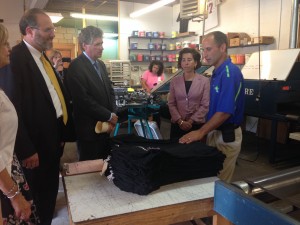
“This business, [with] 17, 18 employees, this is the lifeblood of Rhode Island’s economy. Most Rhode Islanders work for companies just like this, [with] 10, 20, 30, 40, 50 employees,” Raimondo said. “So, as governor, I am very focused on making it easier to do business, less expensive to do business.”
Some of the initiatives that Raimondo spoke about were big parts of the state budget, like the elimination of the sales tax on energy for businesses, as well as decreasing the corporate minimum tax from $500 to $450. Raimondo also took the time to highlight other parts of her jobs plan, such as the streetscape improvement fund, a small business assistance program run by the Commerce Corporation, and a program for “innovation vouchers.”
“Think of it as a coupon,” Raimondo said. “You can come to the Commerce Corporation, get a coupon, and then redeem your coupon at one of our local universities to get access to R&D. If you have a new technology you want to investigate, if you’re a healthcare company, if one of your clients is a healthcare company, a lot of the times they want access to a research team at URI or Brown or RISD or Johnson & Wales. Get the coupon from the Commerce Corporation, check it in with the university, and have special access. We’re trying to promote more innovation.”
Silva, who has owned and operated Graphic Ink since 1997, said that he was very excited for the governor to come visit his shop, and expressed support for her jobs plan.
“I think her plan that she’s launching is right on point with where small businesses need to be, and small businesses are the backbone of the state in my opinion,” Silva said. “It’s very exciting to hear that she is really encouraging to support small businesses.”
Silva said initiatives like the energy sales tax elimination and the roadside improvements continue to make it easier for his business, and businesses like his, to keep employing people, and therefore invest in the local community. He even said that he believes that, because the state is on an economic upturn, that Rhode Islanders are more likely to invest in small businesses.

“I believe she has recharged the state in a way that, there are many people, companies, organizations, colleges, that have a lot of activity going on. We are an event-based business. We produce things for events. There are lots of things going on, which in turn makes us a busy shop,” he said.
According to Silva, this increase in activity, and reinvestment in small businesses, has opened up a lot of jobs in the community, which is looking for skilled workers. In his opinion, now that the economy is beginning to heal, the next logical step is to work on getting vocational education programs out there for students to become trained laborers right out of high school, or in college. Silva said that he is always willing to train an employee on site, but some positions do require skilled labor, such as graphics or design.
With all of these changes, Silva envisions a bright future for small businesses in Rhode Island.
“I see small business, in my case, [becoming] stronger and stronger, as the owners and employees are willing to put some effort into it. As long as we put some effort into it and work hard, hard work pays off.”
]]>
My colleague Steve Ahlquist previously posted a great story covering the two meetings on July 27 about the proposed construction of the taxpayer-subsidized stadium. One point that was made at the Providence meeting, worth expanding on here, is the issue of the construction trade unions, which have endorsed this project. This piece will make an effort to appeal to both the general membership and leadership of these unions, who will prove to be some of the most important allies in this struggle and, on the other hand, will perhaps be the make-or-break of this deal.
It is important to empathize with the membership, they are facing a massive drop in employment and job sites, with a huge percentage of the rank-and-file out of work. This project would create jobs for a large swathe of their members, something I do not begrudge them for.
But this is a decision I do not think they have properly contemplated. First, while the governor has previously eluded to a hiring push that would target minority workers, the current contractor participating in this project, Gilbane, has one of the worst records of minority hiring in the nation. That is an important issue to discuss because the disenfranchisement of minority workers is a vital one.
Second, and perhaps more importantly, this stadium could generate short-term gains on one project but may in fact kill development in the I-195 land in the near future. As Kate Bramson reported on May 2, any and all further construction hinges on a super-permit that would install a stormwater mitigation mechanism at the proposed open park. Bramson wrote in that piece:
The master permit hinges on a plan to use parkland within the 195 district for stormwater mitigation. Builders are required to treat a percentage of stormwater on parcels they develop. However, if they can’t meet the entire stormwater requirement on a parcel, the master permit allows them to gain credit from the parkland’s treatment of stormwater.
Given the tides and ebbs of Rhode Island politics, this could end up killing future development on the I-195 corridor for up to five years. And on top of that, recall that the federal government also will need to be involved, prolonging the wait. That of course translates out to a much greater amount of time for unemployed union members to remain so. Between an extended waiting period and a traffic-clogging stadium, potential developers in the bio-med and education sectors might take their business elsewhere, keeping that land vacant for a very long time.
Bucking the trend and opposing an endorsement that has already been made by the union is always a tremendously problematic issue, no doubt. It takes courage, gumption, and being versed in the relevant documentary records so to make a cogent case. I would refer interested parties especially to this slideshow produced already by the I-195 Commission, an outline of proposed development by landscape architects that every taxpayer in the state already funded. Just to re-iterate, the state has already paid three times for this land. First, we paid for the de-comissioning and demolition of the old I-195 highway. Second, we paid to have it zoned and developed by the federal government. Third, we paid for the aforementioned landscape architects and other planners to work out the schematics of the park.
If this ballpark scheme goes through, it will cost taxpayers another three times. First they will need to pay for the stadium’s construction. Second they will pay to re-design the sewer and highway system to accommodate the stadium. Third we need to re-develop another parcel of land as a park should the government refuse to accept the idea of a smaller park on the grounds of the stadium.
There is simply too much risk as opposed to reward in this idea and organized labor should rethink their position, not so to undermine their standing but to promote and improve their reputation. This week Boston Mayor Martin Walsh rejected the move to finance the 2024 Olympics with Beantown tax monies, causing their bid for the Games to be voided. That move has probably bought Walsh another term in office and could very well give him a future bid for higher office. The unions in Rhode Island would be wise to take such logic into consideration. To be clear, I am no opponent of labor unions, I am a member of one and was an eyewitness to the Illinois Caterpillar strike in the 1990’s. But this project, should it come to pass due to labor’s support, will be seen by many as a black mark on its record and will be fantastic fare for union busters on both sides of the aisle.
]]>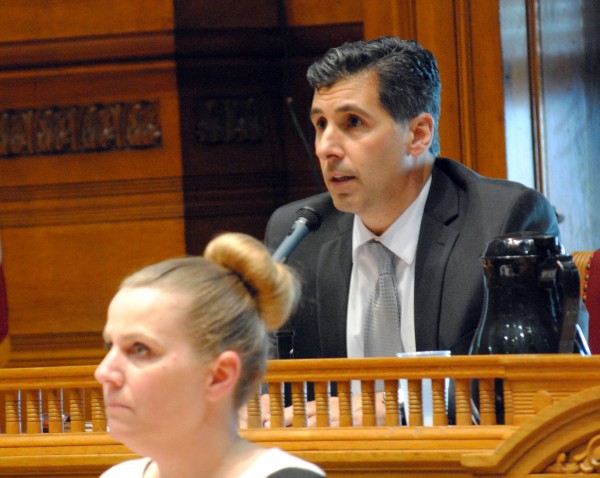
Last year, after the General Assembly stole away the power of cities and towns in Rhode Island to set their own minimum wages, Providence City Councillor John Igliozzi told a packed room of disappointed hotel workers that the city was not prohibited from imposing higher minimum wage standards via tax stabilization agreements (TSAs), which are contracts between cities and private industry, and cannot be interfered with by the General Assembly.
Igliozzi said then that all future TSAs should include strong minimum wage requirements and many other worker protections and rights.
Igliozzi is the chair of the Providence City Council Finance Committee, so one would expect that he would follow up on this proposal, but so far, nothing like this has been incorporated into the new TSAs being cooked up in City Hall and expected to be voted on this week.
When Jesse Strecker, executive director of RI Jobs with Justice, testified before the Finance Committee of the Providence City Council, he presented a short list of proposals to ensure that whatever TSAs were adopted would truly benefit not just the investors and owners of billion dollar corporations but also the working people and families of Providence.
Strecker’s list included the following:
1. Provide good, career track jobs for Providence residents most in need by utilizing apprenticeship programs and community workforce agreements, hiring at least 50% of their workforce from the most economically distressed communities of Providence, with a substantial portion of that workforce made up of people facing barriers to employment such as being a single parent or homeless, or having a criminal record, offering job training programs so local residents are equipped with the skills necessary to perform the available jobs and hiring responsible contractors who do not break employment and civil rights law;
2. Pay workers a living wage of at least $15 per hour, provide health benefits and 12 paid sick days per year, and practice fair scheduling: offering full time work to existing employees before hiring new part time employees, letting workers know their schedule two weeks in advance, and providing one hour’s pay for every day that workers are forced to be ‘on call’;
3. For commercial projects, create a certain number of permanent, full-time jobs, or for housing developments, ensure that 20% of all units are sold or rented at the HUD defined affordable level. Or, contribute at an equivalent level to a “Community Benefits Fund,” overseen and directed by community members providing funding to create affordable housing, rehabilitate abandoned properties, or finance other community projects such as brown field remediation; and
4. Present projected job creation numbers before approval of the project, and provide monthly reporting on hiring, wages and benefits paid, and other critical pieces of information, to an enforcement officer, overseen by a Tax Incentive Review Board comprised of members of the public and appointees of the city council and mayor, to make sure companies are complying with their agreements, and be subject to subsidy recapture if they do not follow through.
Mayor Jorge Elorza submitted an amendment mandating that under the new TSAs, “projects over $10 million will be eligible for a 15-year tax stabilization agreement that will see no taxes in the first year, base land tax only in years 2-4, a 5% property tax in year 5 and then a gradual annual increase for the remainder of the term.”
In return, the “agreements include women and minority business enterprise incentives as well as apprenticeship requirements for construction and use of the City’s First Source requirements to encourage employment for Providence residents.”
But that short paragraph above contains few of the proposals suggested by Strecker.
Supporting the Jobs with Justice proposals are just about every community group and workers’ rights organization in Providence, including RI Building and Construction Trades Council, Direct Action for Rights and Equality (DARE), UNITE HERE Local 217, IUPAT Local 195 DC 11, District 1199 SEIU New England, RI Progressive Democrats of America, Teamsters Local 251, Fuerza Laboral / Power of Workers, Environmental Justice League of RI, RI Carpenters Local 94, Restaurant Opportunities Center RI (ROC United), Mount Hope Neighborhood Association, American Friends Service Committee, Occupy Providence, Olneyville Neighborhood Association (ONA), Fossil Free RI, Providence Youth Student Movement (PrYSM), Prosperity for RI, and the Brown University Warren Alpert Medical School Prison Health Interest Group.
]]>Voting against the increase were Republicans Nick Kettle, of Coventry, Mark Gee, of East Greenwich, and Elaine Morgan, of Ashaway.
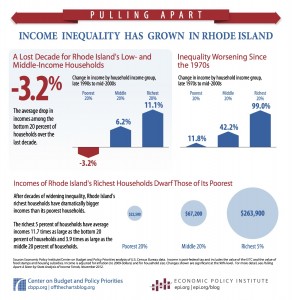
A study from 2012 conducted by the Center on Budget and Policy Priorities (CBPP) showed that from the 1970’s to the mid-2000s, the income gap has grown 70 percent. The poorest 20 percent of Rhode Islanders have only received a 11.8 percent raise in their household incomes, while the richest 20 percent have seen their income grow 99 percent.
In Connecticut and Massachusetts, the percentages are even more disconcerting. The poorest 20 percent of MA residents have seen no change in their income since the 1970s, but the richest 20 percent have had a 151.9 percent increase. Connecticut’s poorest residents have even seen a drop in their income by 4 percent since the 1970s, and a 9.8 percent drop in the past decade, more than both Rhode Island and Massachusetts.
How did this even happen? Kate Brewster, the executive director of the Economic Progress Institute, believes that trends have lead to the widening income gap.
“Our economy has shifted so dramatically,” she said. Brewster stated that over the years, Rhode Island has seen a move from the manufacturing to the service industry, as well as a decline in unionization among employees. These factors have lead to a decline in the minimum wage’s value.
Senator Erin Lynch (D-District 31), the sponsor of the legislation, said the move to $9.60 is a step in the right direction, even though she originally wanted $10.10.
“I would have loved for it to be $10.10,” she said. “I think any step forward is a good step forward.”
Lynch also added that even though raising the minimum wage is definitely a part of eliminating income inequality, it’s not the only piece of the puzzle.
“We want to continue moving in the direction we’re moving. There’s no one magic bullet. We’re working on all kinds of different things.”

Other pieces of the economic puzzle include workforce development, access to capital, and education. Lynch believes that those together can help to level out incomes in the state, especially because they will be able to help those who are providing for their families. Outside of the state house, Lynch works as a divorce lawyer, and sees the hardships that low wages can take on the family unit.
“I see a lot of parents. I see a lot of people getting second and third jobs. People are doing what they need to do to support their families,” she said.
Currently, Rhode Island has one of the highest minimum wages in the country, but will soon fall behind states like Massachusetts, California, and Washington, DC, as they move their wages upwards of $10 an hour going into 2016.
“An adult needs close to $12 to meet their basic needs,” Brewster said. “$10.10 would have been great, but $9.60 is better than $9.”
Lynch stated that she will continue working to move the state economy forward. Hopefully that means a brighter, more equal future for everyone in Rhode Island.
“This is home,” Lynch said. “We want to make it the best place it can be.”
]]> Looking out the window of my office at 10 Davol Square, I can see the empty piece of Providence where they want to build the new baseball stadium.
Looking out the window of my office at 10 Davol Square, I can see the empty piece of Providence where they want to build the new baseball stadium.
Just five weeks ago, this particular parcel of land, left vacant by the relocation of a stretch of interstate, wasn’t any more or less interesting to me than any of the other plots in the Jewelry District. Now, of course, it ignites the imagination of this and many other Rhode Island baseball fans on a daily basis.
When the new Pawtucket Red Sox owners’ proposal came out this week, I didn’t have any strong feelings about it. It sounded like a lot of money, sure. But I know that any successful stadium project relies on some form of public subsidy. $4 million a year (net $2 million, if the economic study commissioned by the owners group is accurate) didn’t sound like too steep a price to keep a critical Rhode Island institution.
But my fellow progressives quickly tore into the proposal like rowdy fans heckling the opposing team’s pitcher. Now, negative reactions to the proposal have come from all points along the political spectrum. But while I certainly didn’t expect all of my friends on the left to endorse plan without some criticism, I’ll admit I was surprised by the steady barrage of unequivocal NO!’s that have come from the left.
Instead of taking a thoughtful, considered approach to this proposal, or carefully positioning ourselves to make a reasonable counter-offer, why are so many progressives rejecting the whole plan outright, unwilling to even hear an argument?
“Because we’re fed up!” some of my fellow liberals will undoubtedly say. Hey, I get it. The frustration is understandable and very real. But letting that frustration get the better of us is a huge mistake. Staking out a position of extreme opposition just feeds the worst stereotypes perpetuated about progressives: that we’re out of touch and inflexible. That makes us easy to marginalize and ignore.
This is not 38 Studios. I know, it seems like an easy connection to make–they both have to do with baseball! Except beyond that thin connection, the two scenarios couldn’t be any more different.
Rhode Island made a loan guarantee to a sports hero who had zero experience running a business, he just happened to like video games.
In this case, we’re talking about giving tax breaks to a group of experienced business people who have already proven their success, who clearly know what they are doing, and who are throwing down their own $85 million to get the thing off the ground. Instead of a software company that will employ a handful of people until it inevitably collapses, this time we’re getting a physical sports facility that will enhance our city and state.
Comparing this–or anything–to 38 Studios is the cheapest and easiest piece of political rhetoric that can be employed in Rhode Island. It gets lobbed from the left, the right and the middle. The comparison absolutely does not apply here. I don’t expect that fact to stop people from making it, but I will hope against hope that progressives, at least, can ditch this cliche in favor of something a little more thoughtful.
There will always be “something better” to spend the money on. Yes, I know the schools and the roads and the bridges are literally crumbling. I know the health care system is in shambles. I know that way too many people will sleep on the streets tonight. We absolutely need to make serious investments in all of these areas. But making any of those things an either/or tradeoff against this baseball stadium is wrong-headed and in some ways disingenuous. How often do we criticize conservatives for making the allocation of public funds a zero-sum game? And yet here are doing the same thing.
According to this rationale, we have to have full employment, state of the art schools in every community, 100% graduation rates, free college tuition, zero homelessness, a cure for cancer, all of our energy coming from renewable sources, guaranteed pensions for every Rhode Islander and protected bike lanes in all 39 cities and towns before we can even begin to think about a new baseball stadium. I disagree.
Can we please stop demonizing those we don’t agree with? This does not just apply to some of the personal insults I’ve seen hurled at Mr. Skeffington. This is becoming a really troubling trend among progressives. I know it can be satisfying to go on social media and make public figures out to be villains; it’s also petty, dickish, and the absolute definition of counter-productive. I expect it from right-wing talk radio. I’m appalled and disturbed by it when it comes from liberals and progressives. Please stop.
We have to consider the noneconomic benefits. I recognize that baseball is a business. I also know that baseball is a vital American institution. And whether they’re called the PawSox, ProvSox, RISox or Rhody Sox, our beloved baseball team is a treasure that must be kept in Rhode Island. The proposed new facility will have economic benefits for Providence and Rhode Island. Just as important are the social and cultural benefits which are difficult (if not impossible) to quantify–these cannot be overlooked. Again, it’s not a zero-sum game.
Let’s find a way to make this work. Let’s recognize the importance of professional baseball to our cultural and civic landscape. You don’t have to be a huge fan of the sport to be able to acknowledge the contribution baseball has always made to our history, our society, and our way of life–and to understand that to lose this team would be a devastating psychological blow to the Ocean State. I think most of those who will read this do understand. I think knowing just how much it would hurt to lose our Sox is exactly why the reactions have been so visceral. “How dare these rich people extort us like this!” some say. And rather than be backed into a corner, throw up their hands and say “Fine, take the team somewhere else! We don’t need you!”
Believe me, I do understand this sentiment, even if I don’t agree with the characterization that this is extortion. It’s business, and we’ve been wrestling with the tension between baseball-the-beloved-national-game and baseball-the-money-making-enterprise since the first professional leagues came about. But to dig in and shout “no!” instead of finding a way to move forward is a mistake. To give up on keeping the team because of some misguided principled stand would just feed another pervasive stereotype about those of us on the left: we’re all too ready to cut of our nose to spite our face.
I recognize how difficult it may be for many readers to come around to accepting the team owners’ proposal as it currently exists. That’s fine. But if the root of the word “progressive” is “progress,” then who better than progressives to craft an open, accessible, and constructive dialogue so that we can reach an agreement that benefits us all, rather than just toss our bat and retreat back to dugout just because we didn’t like the look of the first pitch?
]]>
A new study says a carbon tax in the state would create between 2,000 and 4,000 jobs, as well as create up to $900 million in state revenue by 2040. Scott Nystrom, a senior economic associate and project manager for Regional Economic Models, Inc. presented the study’s findings at Brown University.
Sponsored by the Energize Rhode Island Coalition, REMI’s study examined the possible benefits and consequences of instituting such a tax in the state.
Introduced this year, the Carbon Pricing Act has been tabled for the session but will be resubmitted next year. The bill, if passed, would be the first of its kind in the United States, setting an environmental standard for the rest of the country. More information can be found here.
Energize Rhode Island is currently promoting the Clean Energy Investment and Carbon Pricing Act, which would impose a carbon price (or tax) on all fossil fuels at the first point of sale within the state. The price would be $15 per ton of carbon dioxide for the first year the act is in effect, and raise at a rate of $5 per year.
The Carbon Pricing Act has two main goals – to provide a disincentive for using fossil fuel revenue to compensate for the cost of moving toward green energy. The price would be returned to Rhode Island’s economy in four different ways: a dividend check to households, a dividend to employers based on their share of state employment, a fund for energy efficiency costs, and administrative overhead.
According to REMI’s analysis, Rhode Island would receive positive benefits from implementing a carbon price.
“You actually have more jobs in Rhode Island that you would have otherwise with this policy,” Nystrom said during his presentation. Although the impact is relatively small, only around 1 percent of the jobs in the state, that’s still 2,000 to 4,000 jobs that were not there before. The Coalition says 1,000 of these jobs would be created within the first two years of the price’s introduction.
Total gross state product would rise as well, with the construction industry gaining roughly $86 million. The only industry that takes a serious hit due to the price is chemical manufacturing, which would lose $16 million. Real personal income would also increase between $80 and $100 million dollars during that time.
Nystrom also explained that instituting a carbon price could result in a population increase.
“Because the labor market is stronger, it draws more people to the state to an extent,” he said. “They move into the state as a consequence of the labor market, they buy a house, they settle down, and they increase the state’s population.”
With all of the new jobs and people living in Rhode Island, state revenues would be on the rise as well, earning between $200 and $900 million through the 2030s.
For all these benefits, cost of living would only increase minimally.
“Even though this does increase the cost of energy for states, It’s about a half a percent,” Nystrom said. “This means you have three months of extra inflection between now and 2040 than you would have otherwise.”
Carbon emissions were not the main focus of the study, but Nystrom did add that they would decrease over the course of a few years, and then stabilize.
“Emissions are purely a byproduct,” he said. “This is a result of the model.”
]]>
